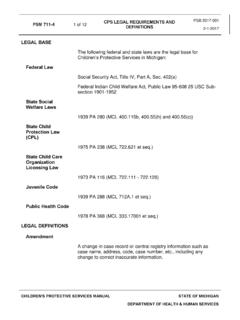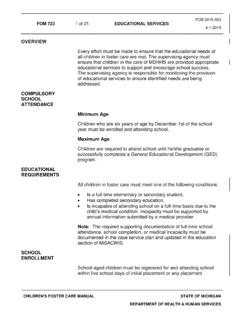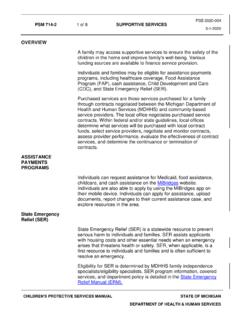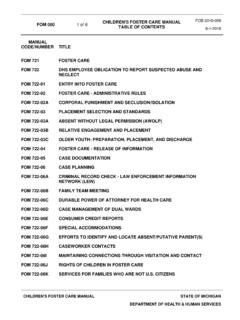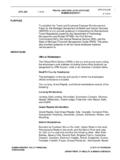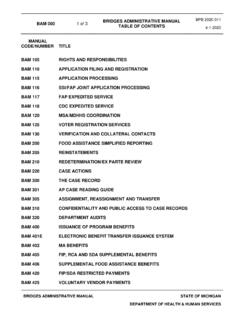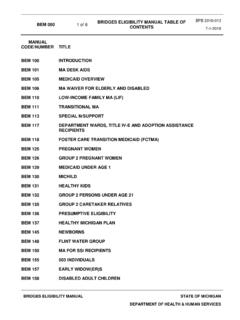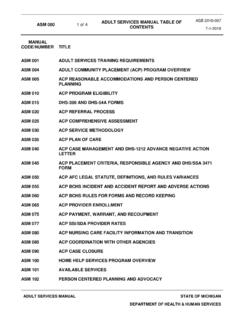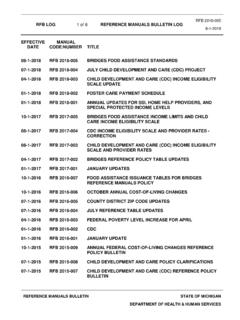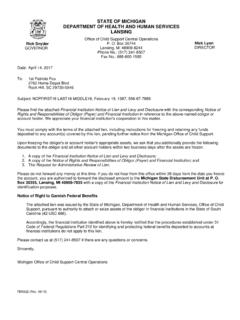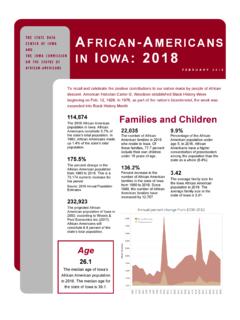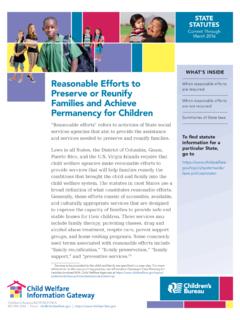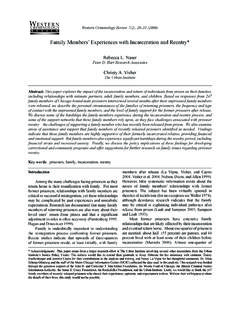Transcription of FOB 2014-002 FOM 722-06 1 of 17 CASE PLANNING …
1 FOM 722-06 1 of 17 case planning FOB 2014-002 2-1-2014 children 'S FOSTER CARE MANUAL STATE OF MICHIGAN DEPARTMENT OF HEALTH & HUMAN SERVICES OVERVIEW case PLANNING is a cooperative effort in which the caseworker and the family develop a road map for moving a child to permanency, while simultaneously addressing the child s safety and well-being. The purpose of case PLANNING is to: Identify the behaviors or conditions that have contributed to the child s removal from the home. Provide a clear and specific guide for the caseworker and the family for changing the behaviors and condition. Establish benchmarks to measure family and child progress for achieving outcomes. Efforts to resolve the presenting problem(s) must be documented in the case service plan presented to the court to facilitate the determination of reasonable efforts; see FOM 722-08, Initial Service Plan, FOM 722-09, Updated Service Plan or FOM 722-09D, Permanent Ward Service Plan.
2 Once the presenting problem which led to the child's out-of-home placement has been resolved and the safety of the child is ensured, the child must be promptly returned to parental care. LEGAL AUTHORITY Federal The Adoption Assistance and Child Welfare Act, 96-272 Requires, as a condition of receiving federal foster care matching funds, that states make ''reasonable efforts'' to prevent removal of the child from the home and return those who have been removed as soon as possible. Requires participating states to establish reunification and preventive programs for all in foster care. Requires the court or agency to review the status of a child in any nonpermanent setting every six months to determine what is in the best interest of the child, with the most emphasis placed on returning the child home as soon as safely possible.
3 FOM 722-06 2 of 17 case PLANNING FOB 2014-002 2-1-2014 children 'S FOSTER CARE MANUAL STATE OF MICHIGAN DEPARTMENT OF HEALTH & HUMAN SERVICES Requires the court to determine the child's future status, whether it is a return to parents, adoption, or continued foster care, within 18 months after initial placement into foster care. Adoption and Safe Families Act of 1997, 105-89 Clarifies reasonable efforts. Requires states to specify situations when services to prevent foster placement and reunification of families are not required. Requires shorter time limits for making decisions about permanent placements. Requires permanency hearings to be held no later than 12 months after entering foster care. Requires states to initiate termination of parental rights proceedings after the child has been in foster care 15 of the previous 22 months, except if not in the best interest of the child, or if the child is in the care of a relative.
4 State MCL Order affecting non-parent adult. MCL Ex parte order authorizing immediate protective custody of child. MCL Definitions; petition; release of juvenile; order removing abusive person from home; placement of child; foster care; conditions; duty of court to inform parties; criminal record check and central registry clearance; family-like setting; parenting time; review and modifica-tion of orders and plans; release of information; information included with order; "abuse" defined. MCL Permanency PLANNING hearing; conditions; time limitation; reunion of child and family not required; purpose; obtaining child's views regarding permanency plan; consideration of out-of-state place-ment; notice; statement; return of child to parent; noncompliance with case service plan; other conditions as evidence; termination of FOM 722-06 3 of 17 case PLANNING FOB 2014-002 2-1-2014 children 'S FOSTER CARE MANUAL STATE OF MICHIGAN DEPARTMENT OF HEALTH & HUMAN SERVICES parental rights to child; exceptions; alternative placement plans; powers and appointment of guardian; information considered as evidence; revocation or termination of guardianship.
5 REVIEW OF PRIOR CPS AND FOSTER CARE RECORDS Prior to developing the case service plan, caseworkers must review the current children s Protective Services (CPS) record and any other CPS files on the child and the parent(s). If the child was previ-ously in foster care, the caseworker must make and document efforts to locate and obtain the closed CPS and foster care case record(s). All available former records must be reviewed and evalu-ated for: Patterns in abuse history for both the victim and the parent(s). Prior parental compliance, participation and benefit of past services. Identification of relatives or significant others that could be used as a support system to the child or as possible placement. Results of the review and evaluation of closed CPS and foster care case files must be documented in the case service plan.
6 DEVELOPING THE case SERVICE PLAN Casework service requires the engagement of the family in devel-opment of the case service plan. This engagement must include an open conversation between all parents/guardians and the case -worker in: Discussing needs and strengths. Establishing the case service plan. Reaching an understanding of what is required to meet the goals of the case service plan. Discussing concurrent permanency PLANNING ; see FOM 722-07A, Concurrent Permanency PLANNING . FOM 722-06 4 of 17 case PLANNING FOB 2014-002 2-1-2014 children 'S FOSTER CARE MANUAL STATE OF MICHIGAN DEPARTMENT OF HEALTH & HUMAN SERVICES In most cases the permanency goal will be reunification. The family is to be extensively involved in case PLANNING and must have a clear understanding of all the conditions which must be met prior to the child's return home, how these relate to the petition necessitating out-of-home placement, and what the supervising agency will do to help the family meet these conditions.
7 MCL (8)(c) states that parental compliance with the case service plan is voluntary until court disposition, unless the court orders otherwise. Declining to participate, prior to the dispositional hearing, will not be viewed as failure to comply with the supervising agency. Parental Engagement Parental participation in case service plan development is required. Parental engagement is an invaluable tool for achieving an early return home for children in foster care. Parents must be encour-aged to actively participate in developing the Parent-Agency Treatment Plan and Service Agreement section of the case service plan. This section must state specifically what the parents will need to do to achieve reunification, and what the agency will do in support of parental objectives. The parent-agency treatment plan and service agreement must be Specific to the individual needs of the family and child(ren).
8 Inclusive of the family s viewpoint. Written in a manner that is easily understood by all parties. Note: If all goals, activities and outcomes are formulated solely by the caseworker, the plan cannot be considered a mutually developed treatment plan. If the parents are not involved in developing or refuse to sign the case service plan, the caseworker must: Document the reasons why the parent is not involved or refuses to sign the Parent-Agency Treatment Plan and Service Agreement; see FOM 722-08C, Parent-Agency Treatment Plan and Service Agreement. Identify and document additional actions needed to secure the parent s participation in service PLANNING and compliance with the case plan. FOM 722-06 5 of 17 case PLANNING FOB 2014-002 2-1-2014 children 'S FOSTER CARE MANUAL STATE OF MICHIGAN DEPARTMENT OF HEALTH & HUMAN SERVICES Absent/Putative Parents Developing the case service plan and parental involvement also requires the caseworker making attempts to identify and locate an absent parent/legal guardian or putative father; see FOM 722-06G, Efforts to Identify and Locate Absent/Putative Parent(s).
9 incarcerated Parents The caseworker must make reasonable efforts to identify and locate an incarcerated parent. An incarcerated parent may provide important information about the child, as well as identify any available relatives that may be able to provide placement and support for the child. Locating an incarcerated Parent The caseworker can use, but is not limited to, the following resources to locate an incarcerated parent and identify services available at a jail or prison: For parents under the jurisdiction of the Michigan Department of Corrections: For parents in federal prisons: For parents in out-of-state facilities: or by contacting the facility. For parents in county jails, contact the county facilities directly. Once an incarcerated parent is located, the caseworker must con-firm and document the following information: Charge or conviction offense.
10 Prisoner or jail number. Parole or release eligibility. Earliest release date. Engaging the incarcerated Parent In cases where reunification is the permanency goal, the case -worker must engage the parent in the case service plan regardless of how long that parent will be incarcerated . FOM 722-06 6 of 17 case PLANNING FOB 2014-002 2-1-2014 children 'S FOSTER CARE MANUAL STATE OF MICHIGAN DEPARTMENT OF HEALTH & HUMAN SERVICES The caseworker must make monthly contact with the incarcerated parent through face-to-face contact, letter, email, or phone contact. Upon locating the incarcerated parent, the caseworker must send the incarcerated parent a letter that explains the purpose of the case service plan and request the following information: Whether he or she wishes to remain a parent to the child, and to identify any relatives who may be interested in placement.
